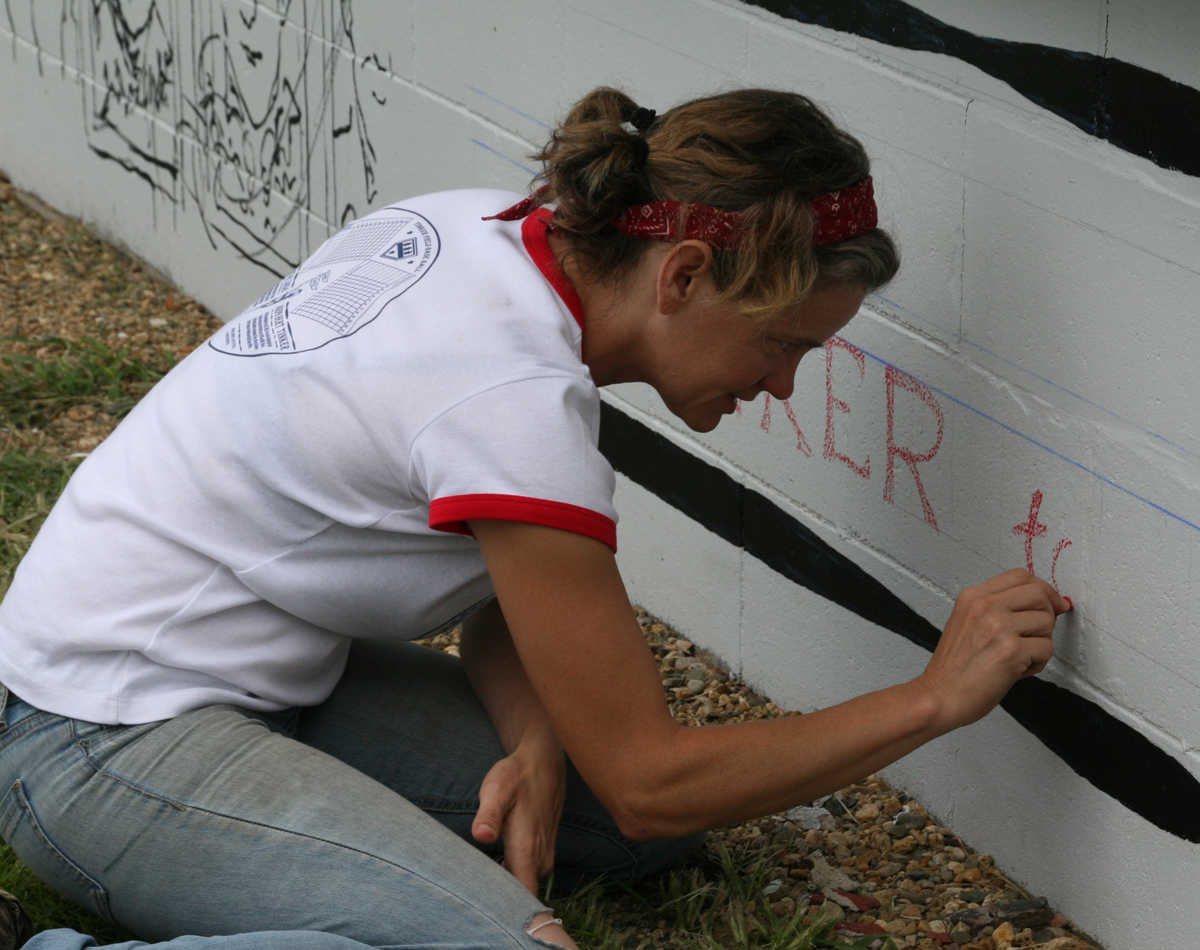Several people have asked why we have spent so much time supporting and promoting Muscotah. I have been remiss in explaining this part!
TO LEARN
Two towns were chosen to help us learn some things so we could create a successful program called Kanstarter (formerly known as the We Kan! Bank), that will be of benefit to all Kansas communities.
The plan is for Kanstarter to operate somewhat like Kickstarter, a crowdsourcing funding mechanism for the global creative arts world. Kanstarter will be used to connect community projects with those who want to help through volunteerism or donations. The bottom line is to develop and support projects that will help sustain communities.
FIRST HAND EXPERIENCE
In 2009, we chose to "practice" in Whiting (Jackson County, population 200) with a project commonly known as the Whiting Cafe Makeover. Through a statewide and global network, we raised over $6,000 and had dozens of volunteers show up for a work weekend.
Our next effort was to support Muscotah (Atchison County, population 200) with their dream of capitalizing on native son and major league baseball Hall of Famer, Joe Tinker, in creating a spark for the town.
STATISTIC: Of the 626 incorporated cities in Kansas, more than half have less than a 400 population. What are we, as a state, doing to support these volunteer-led towns?
WHY WHITING AND MUSCOTAH?
Every year the Kansas Sampler Foundation does a Retreat for Rural Leaders at the Barn Bed-and-Breakfast in Valley Falls. The retreat includes an annual field trip in order to have a first-hand experience with the theme of the year.
Whiting and Muscotah are within close proximity to Valley Falls.
Jeff and C.J. Hanson of Muscotah came to Whiting to help with the Whiting Cafe project. Jeff caught the "fever" and came up with a dream for his town. This led to several Muscotah visits from our retreat attendees over the last four years.
INSPIRATION
The first year we visited Muscotah, we met in the city building. We all sat in a circle. The Muscotah folks went first to introduce themselves. Without being prompted, each one said how many years they had lived in the town and why they loved it. In the dead of a wet winter the town was looking dreary with its unpaved roads and abandoned business buildings. By the time the last Muscotah person spoke, our hearts were warmed and we were ready to run through a brick wall for them.
We came back a year or two later to check on them and to see how their dream was progressing. That's when the idea was hatched to convert the old round water tower tank into the World's Largest Baseball. From there, the room was buzzing with ideas and promises -- and hope.
WE COMMITTED
Our group committed to being there for them, to use our individual and group networks and resources to help them be the best they could be at being Muscotah. They would have to do the bulk of the work. We would be like back-up singers to the main act.
THE NETWORK
Could the simple use of a network help raise the funds, produce volunteers and experts, find technical know how, promote events like the Work Weekend and Joe Tinker Day, and attend and celebrate with Muscotah in a manner that would make a difference?
Clearly, the answer is yes.
Muscotah citizens did all the heavy lifting. The "outside world" rallied around them.
WHO WON?
Muscotah was a winner because of the exposure and many tangible results for their community.
Those who took part as volunteers, technical resource experts, or financial contributors were winners because of the satisfaction they received being part of a group that literally helped boost a town forward.
Local and area businesses were winners, too, because supplies were purchased from them.
DID IT SEEM LIKE THIS WAS JUST ALL ABOUT MUSCOTAH?
As the clearinghouse, the Kansas Sampler Foundation observed this "experiment" through the eyes of Muscotah, the volunteers, the donors, the media, and all of the parties involved. With what we learned, we have a better chance of making Kanstarter a better product as we work with Reflective Group in developing this online mechanism of support for all Kansas communities.
A DOZEN THINGS WE'VE LEARNED OVER THE YEARS ABOUT COMMUNITY PROJECTS
1) Buy in. Community projects work best if everyone has had a chance to offer ideas, comments, or questions.
2) All age groups. Don't just count on the usual players. Enlist input from all age groups. Really listen.
3) Communicate. Keep everyone informed. Find the best communication method whether it be a posted message or social media.
4) Strong leadership. Calm, focused, respected leaders are needed to take a town through the tough times.
5) Do what is right. The popular plan might not always be what is right. Stick with what is right.
6) Community foundation. A trusted mechanism for receiving donations is a necessity.
7) Network. The most interested people in supporting your community are those who have graduated or once lived in your town. Developing a list of these people and staying in touch is priceless.
8) Set your ego aside. This is not about you. It's about community, it's about being a team. Make it so.
9) Make it worthwhile. In this day of busy people and crowded calendars, each meeting and each event needs to be worthy of everyone's time.
10) Help others, they'll help you.
11. Coffee shop talk. Be the supportive and positive voice.
12. Celebrate. Have fun with your community!
Each experience helps KSF "get" Kansas! KE #2 Marci Penner






















